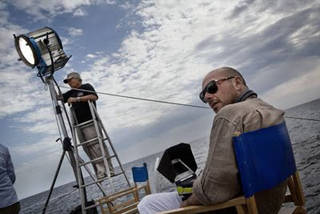Terraferma, the Italian Candidate for Best Foreign Language Film
Terraferma (Mainland) by Roman director Emanuele Crialese is the film Italy has chosen to send to the Academy of Motion Picture Arts and Science as the Italian representative in the Academy Awards run. Crialese won his spot over other important Italian directors: Nanni Moretti with his Habemus Papam, Alice Rohrwacher with Corpo celeste, Massimiliano Bruno with Nessuno mi può giudicare, Mario Martone with Noi credevamo, Emidio Greco with Notizie dagli scavi, Giuseppe Gagliardi with Tatanka and Michele Placido with Vallanzasca.
On January 24th we will know if the film has been selected by the Academy to compete in the foreign film section. The director is known to the American public for his previous work, specifically the films Nuovomondo, Respiro and Once we were strangers.
In 2003, Pinocchio by Roberto Benigni was selected to represent Italy at the world’s biggest film award ceremony although many believe that Respiro should have been the country’s choice. That year another great film was snubbed: L'ora di religione by Marco Bellocchio.
The committee responsible for the selection at A.N.I.C.A. (Archivio Informatico del Cinema Italiano, Computerized Archive of Italian Cinema) was formed by Nicola Borrelli (president), Marco Bellocchio (film director), Martha Capello (president of AGPC, Associazione Giovani Produttori Cinematografici, Association of young film directors), Francesca Cima (producer), Tilde Corsi (producer), Paola Corvino (president UNEFA, Union of Film and Audiovisual Exporters), Valerio De Paolis (distributor), Luca Guadagnino (film dirctor) and Niccolò Vivarelli (journalist).
“I am extremely happy and honored. I cannot say I was expecting it, but I must say that I was hoping for it,” Crialese said, with hints of emotion in his voice, to the press. “There was no real competition among us directors. We are a team in situations like this. They all are great directors and I do not feel I am competing against them but I am competing with them.”
The film, produced by Cattleya and Rai Cinema in collaboration with Sensi Cinema - Regione Sicilia, has, according to the director himself who has studied in the United States, many different themes that can really interest an American audience. “Americans are very sensitive in regards to all stories focused on human relations and social conflict. They feel close to stories about evolution.”
The law of the sea says that anyone in need of help must be saved while the law of the authorities has different rules. The sea, filled with fish in the past, is now filled with men looking for help or even worse, it is filled with corpses. At the bottom of the sea fish swim among shoes, documents, toys and the apparently insignificant objects that were dear to an emigrant who has lost his/her life in those waters. And then there is an island: although too small to even appear on a map it becomes the center of a world where tanned tourists dance on the boats and the immigrants look like beached whales.
This island of the Mediterranean, Linosa but it could be Lampedusa or any other final destination, is the backdrop of Crialese’s story… the touching reflection of the Italy of today which is welcoming with its heart but wary of a possible African invasion and social changes.
Terraferma is a choral film but at its core there is the conflict between two women both wishing to have a future somewhere else and to improve their lives. Sara (Timnit T., is a real life immigrant Crialese met through Laura Boldrini, representative at the UN) comes from Ethiopia. It takes her two years to come to Europe and in these two years she even is arrested in Lybia and raped. And there is Giulietta (Donatella Finocchiaro) a young widow, who is tired of the island and of fishing boats. When they bring Sara to her she reacts badly. And there is Filippo (Filippo Pucillo), her young son, who is confused about what to do with his life. On one side there is tradition represented by his grandfather (Mimmo Cuticchio) who is a fisherman, and on the other there is modernity, represented by his tacky uncle Nino (Giuseppe Fiorello) who invites tourists to enjoy the sun and forget about everything else. The community of the local fishermen and the sea itself are other important characters in the story.
In his fourth film, Crialese abandons the dreamlike atmosphere of his previous films for a story suspended between reality and myth that rework what is happening to our Terraferma.









































i-Italy
Facebook
Google+
This work may not be reproduced, in whole or in part, without prior written permission.
Questo lavoro non può essere riprodotto, in tutto o in parte, senza permesso scritto.